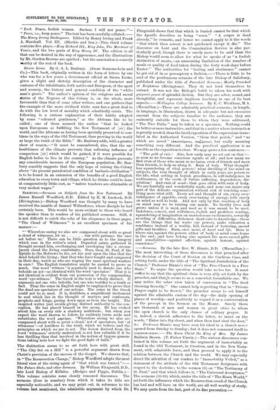SERMONS.—Sernions on Subjects from the New Testament. By James Russell
Woodford, D.D. Edited by H. M. Luckock, D.D. (Rivingtons.)—Bishop Woodford was thought by many to have received the mantle of Samuel Wilberforce, whose disciple he had certainly been. This would be more evident to those who heard the speaker than to readers of his published sermons. Still, it is not difficult to catch the echo of his eloquence in these pages. "The Cloud of Witnesses" is an excellent specimen of his manner :— "Wherefore seeing we also are compassed about with so great a cloud of witnesses, let us run with patience the race set before us.' There can be little question as to the imagery which rose in the writer's mind. Departed saints gathered in thought around him, overhanging and enveloping like a circum- jacent cloud the living combatants. Does, then, St. Paul, if the Epistle to the Hebrews be his, set his seal upon the idea that the dead behold the living; that they who have fought and conquered in their day, watch us who are waging the same spiritual warfare in ours ? The English translation might be quoted to prove as much. Our word 'witness' is popularly used to denote one who beholds an act—as identical with the word 'spectator.' That it is not identical is evident from our possession of the compounding word eye-witness.' The Greek in the text is wholly distinct. It expresses not one who beholds, but one who testifies to a truth or fact. Thus the sense in English might be employed to prove that the dead are spectators of our actions. The sense in the Greek could not be so used. It is, doubtless, a magnificent incitement to zeal which lies in the thought of martyrs and confessors, prophets and kings, gazing down upon us from the height. The inspired writer just avoids giving distinct authority to the con- ception. He has placed himself in the arena. He has evoked about him on every side a shadowy multitude ; but when you expect the word'‘Toirrat to follow, he suddenly turns aside and substitutes the word ,tuipsUper. Wherefore seeing we also are compassed about with so great a cloud,' not of spectators, but of witnesses '—of testifiers to the truth which we believe and the principles on which we are to act. The lesson derived from the word witnesses,' strictly understood, is not less valuable if it be less thrilling than that involved in the notion of bygone genera- tions taking note how we fight the good fight of faith."
The distinction seems to us set forth here with great skill. "The City Set on a Hill" is a powerful argument drawn from Christ's prevision of the success of the Gospel. We observe that, in "The Resurrection Change," Bishop Woodford adopts the most literal view of the rising again of "that which was buried."— The _Future State, and other Sermons. By William Fitzgerald, D.D., late Lord Bishop of Killaloe. (Hodges and Figgis, Dublin.)— This volume contains some closely reasoned discourses. The sermons (four in number) from which it takes its title are especially noticeable, and we may point out, in reference to the volume last mentioned, the admirable argument by which Dr. Fitzgerald shows that that which is buried cannot be that which the Apostle describes as being "sown." " A corpse is dead already," he remarks, and hence we cannot apply to it the words "that which thou sowest is not quickened except it die." The discourse on Lent and the Commination Service is also par- ticularly good, though there is surely more to be said than the Bishop would seem to allow for what he speaks of as "a foolish distinction of meats,—an unmeaning limitation of the number of meals or quality of food taken during the forty week-days before Easter." The authorities for "fasting and abstinence" cannot be got rid of in so peremptory a fashion.—There is little to be said of the posthumous sermons of the late Bishop of Salisbury, published under the title of Parochial Sermons ; Mostly Preached at Brighstone (Rivingtons). They do not lend themselves to extract. It was not the Bishop's habit to adorn his work with purpurei panni of splendid diction. But they are sober, sound, and thoughtful, and represent Anglican teaching in one of its best aspects.—Wellington College Sermons. By E. C. Wickham, M.A. (Macmillan.)—These are admirably practical sermons ; in length, in language, in illustration, drawn in adequate but not excessive amount from the subjects familiar to the audience, they are eminently suitable for those to whom they were addressed, "The Two Paths" may be taken as a specimen. Nothing could be better or more instructive, and that in a matter where instruction is greatly needed, than the lucid exposition of the expressions trans- lated in the Authorised Version, "them that perish," and "us which are saved" (ioroxiaghEvoi, cro4Leyol), but really meaning something very different. And the practical application is as forcible as the exposition is clear. We may quote a few sentences :—


















































 Previous page
Previous page